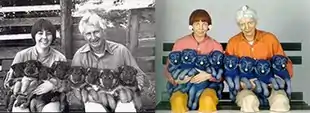Rogers v. Koons
Rogers v. Koons, 960 F.2d 301 (2d Cir. 1992),[1] is a leading U.S. court case on copyright, dealing with the fair use defense for parody. The United States Court of Appeals for the Second Circuit found that an artist copying a photograph could be liable for infringement when there was no clear need to imitate the photograph for parody.
| Rogers v. Koons | |
|---|---|
 | |
| Court | United States Court of Appeals for the Second Circuit |
| Full case name | Art Rogers v. Jeff Koons; Sonnabend Gallery, Inc. |
| Argued | October 3, 1991 |
| Decided | April 2, 1992 |
| Citation(s) | 960 F.2d 301; 1992 U.S. App. LEXIS 5792; 22 U.S.P.Q.2D (BNA) 1492; Copy. L. Rep. (CCH) ¶ 26,893; 20 Media L. Rep. 1201 |
| Case history | |
| Subsequent history | Cert. denied, 506 U.S. 934 (1992) |
| Procedural history | Summary judgment granted in part to plaintiff, 751 F. Supp. 474 (S.D.N.Y. 1990); amended on rehearing, 777 F. Supp. 1 (S.D.N.Y. 1991) |
| Holding | |
| An artist who reproduced a photograph as a three-dimensional sculpture for sale as high-priced art could not claim parody as a defense for copyright infringement, when the photograph itself was not the target of his parody. | |
| Court membership | |
| Judge(s) sitting | Circuit Judges Richard J. Cardamone, Lawrence Warren Pierce, John M. Walker, Jr. |
| Case opinions | |
| Majority | Cardamone, joined by Pierce, Walker |
| Laws applied | |
| 17 U.S.C. § 101, et. seq. (Copyright Act of 1976) | |
Background

Art Rogers, a professional photographer, took a black-and-white photo of a man and a woman with their arms full of puppies. The photograph was simply entitled, Puppies, and was used on greeting cards and other generic merchandise.
Jeff Koons, an internationally known artist, found the picture on a postcard and wanted to make a sculpture based on the photograph for an art show on the theme of banality of everyday items. After removing the copyright label from the postcard, he gave it to his assistants with instructions on how to model the sculpture. He asked that as much detail be copied as possible,[2] though the puppies were to be made blue, their noses exaggerated, and flowers to be added to the hair of the man and woman.
The sculpture, entitled, String of Puppies, became a success. Koons sold three of them for a total of $367,000.
Upon discovering that his picture had been copied, Rogers sued Koons and the Sonnabend Gallery for copyright infringement. Koons admitted to having copied the image intentionally, but attempted to claim fair use by parody.
Opinion of the Court
The Court found both "substantial similarity" and that Koons had access to the picture. The similarity was so close that the average lay person would recognize the copying, a measure for evaluation. Thus the sculpture was found to be a copy of the work by Rogers.
On the issue of fair use, the court rejected the parody argument, as Koons could have constructed his parody of that general type of art without copying Rogers' specific work. That is, Koons was not commenting on Rogers' work specifically, and so his copying of that work did not fall under the fair use exception.
Award
The Court of Appeals determined that there were issues of fact and remanded the issue of damages to the District Court. Koons and Rogers, however, reached a confidential settlement.[3]
References
- Rogers v. Koons, 960 F.2d 301 (2d Cir. 1992).
- Court of Appeals for the Second Circuit (April 2, 1992). "Art Rogers, Plaintiff-Appellee-Cross-Appellant v. Jeff Koons Sonnabend Gallery, Inc., Defendants-Appellants-Cross-Appellees, 960 F.2d 301 (2d Cir. 1992)". 960 F.2d 301 Nos. 234, 388 and 235, Dockets 91-7396, 91-7442 and 91-7540.
In his "production notes" Koons stressed that he wanted "Puppies" copied faithfully in the sculpture. For example, he told his artisans the "work must be just like photo — features of photo must be captured;" later, "puppies need detail in fur. Details — Just Like Photo];" other notes instruct the artisans to "keep man in angle of photo — mild lean to side & mildly forward — same for woman," to "keep woman's big smile," and to "keep [the sculpture] very, very realistic;" others state, "Girl's nose is too small. Please make larger as per photo;" another reminds the artisans that "The puppies must have variation in fur as per photo — not just large area of paint — variation as per photo." (emphasis supplied).
- Inde, Vilis. Art in the Courtroom (Praeger, 1998) (Chapter 2: Jeff Koons: Piracy or Fair Use)
External links
- Text of Rogers v. Koons, 960 F.2d 301 (2d Cir. 1992) is available from: CourtListener Google Scholar Justia OpenJurist